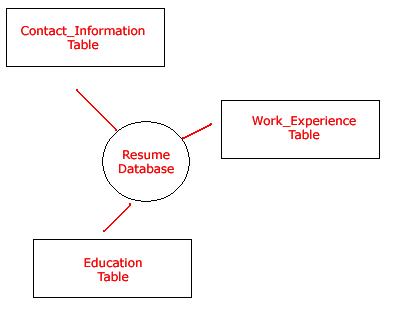Access 2000
Database Tables
Understanding Table Relationships
Databases can be simple -- consisting of a single table -- or made up of many different tables. If you were to convert your resume into a database, for example, you might have a table that contains your name and personal mailing address. We might call this the Contact_Information table.

Your work experience is a different kind of information. Instead of identifying who you are or where you live, it identifies the companies you worked for, their addresses, your job title, and responsibilities. Because this set of information is independent from the contact information, we might instead create a second table called the Work_Experience table.
The same is true of your educational background. It has no direct bearing on your contact information or the companies where you worked. A third table might be created called the Education table to save this kind of data.
The database contains three tables, each independent of the other, and all containing different types of information. The database needs a way to connect these three tables.






